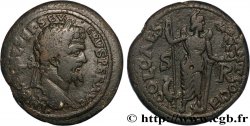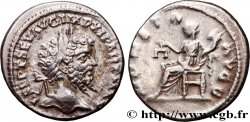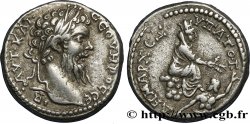v26_0315 - SEPTIMIUS SEVERUS Sesterce, (GB, Æ 31)
MONNAIES 26 (2006)
Starting price : 175.00 €
Estimate : 250.00 €
unsold lot
Starting price : 175.00 €
Estimate : 250.00 €
unsold lot
Type : Sesterce, (GB, Æ 31)
Date: 195
Mint name / Town : Roma
Metal : copper
Diameter : 30,5 mm
Orientation dies : 12 h.
Weight : 22,23 g.
Rarity : R1
Officine: 2e
Emission: 8e
Coments on the condition:
Beau portrait. Flan ovale, irrégulier et légèrement échancré. Frappe molle au revers avec un usure importante, mais exemplaire parfaitement lisible. Patine marron foncé, piquée et granuleuse
Catalogue references :
Obverse
Obverse legend : L SEPT SEV PERT - AVG [IMP] V.
Obverse description : Tête laurée de Septime Sévère à droite (O*).
Obverse translation : "Lucius Septimus Severus Pertinax Augustus Imperator quintum" (Lucius Septime Sévère Pertinax Auguste acclamé empereur cinq fois).
Reverse
Reverse legend : ROMAE AE-TERNAE/ S|C.
Reverse description : Rome assise à gauche sur une cuirasse, tenant une Victoriola de la main droite et une haste de la gauche ; derrière, un bouclier.
Reverse translation : "Romæ Æternæ" (À Rome éternelle).








 Report a mistake
Report a mistake Print the page
Print the page Share my selection
Share my selection Ask a question
Ask a question Consign / sell
Consign / sell
 Full data
Full data









